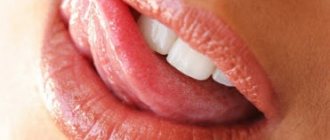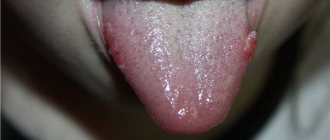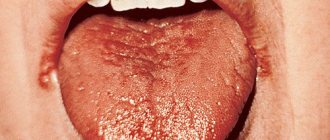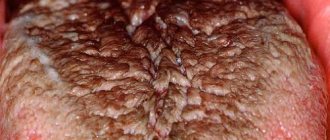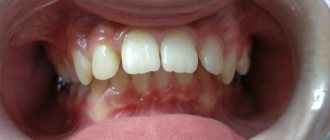What is the problem behind?
The baby cannot speak. He expresses all his desires and needs with the help of gestures and facial expressions. The tongue is one of the tools of communication. If a baby sticks out his tongue, it means he wants to eat or is simply seeking attention. Or he reports that he is sick and does not feel well.
You should be alarmed when the tongue sticks out not only during play, but constantly, even in sleep. In this case, you should definitely visit a pediatrician. After examining the child, he can refer him for consultation to other specialists.
If a child shows his tongue, this may be the cause of neurological, endocrine or infectious diseases. There will definitely be other warning signs.
Disease of the endocrine system – hypothyroidism
The problems are related to the thyroid gland. The main reason is the lack of a trace element such as iodine in the body. To determine its level, blood is examined. Blood is collected from infants from the heel in the maternity hospital.
In addition to the fact that the child sticks out his tongue, other symptoms are present:
- skin color becomes yellow or pale;
- the surface of the skin is dry and flaky;
- there is a delay in mental and physical development;
- the tongue protrudes outward because it does not fit in the mouth due to large swelling;
- the area around the nose and lips becomes blue;
- no weight gain;
- persistent constipation develops.
In this case, treatment (the basis of therapy is hormones) and additional examination (ultrasound, blood tests) are prescribed by an endocrinologist.
Neurological disorders - atrophy of facial muscles
The trigeminal nerve is most often affected. This may occur due to malfunctioning of the thyroid gland. The problem becomes a consequence of previous respiratory diseases or various facial injuries.
Additional symptoms appear:
- the face becomes immobilized, facial expressions change (the child does not cry, does not smile, there are no facial folds);
- swelling of the lips is observed;
- facial asymmetry is observed;
- eyelids droop;
- the chin moves to the side.
The treatment is carried out by a neurologist. The results of MRI and ultrasound examinations may be needed. Treatment is mainly medicinal. Additionally, vitamins, massage, and physiotherapy are prescribed.
Infectious disease - thrush
The mucous surface of the oral cavity is affected. The reasons for its occurrence may be a decrease in immunity, frequent regurgitation.
The child sticks out his tongue, and other symptoms appear:
- a white, cheesy coating appears in the mouth;
- gums, tongue, palate become inflamed and red;
- If treatment is not started, the plaque becomes gray or yellow.
Consultation with an infectious disease specialist and dermatologist is necessary. Ointments and solutions, vitamins, and drugs that help improve immunity are prescribed locally.
The main condition is compliance with a special diet for a nursing mother.
Stomatitis
The reason that the baby constantly shows his tongue may be stomatitis. This disease occurs when viruses and bacteria enter the body. The symptoms are easy to notice:
- the oral cavity is inflamed, swollen, red;
- ulcers are clearly visible, which can appear anywhere: on the tongue, on the palate, on the gums;
- body temperature rises;
- the child is capricious and refuses to eat;
- sleep becomes restless.
A dentist, immunologist, and infectious disease specialist can help. Vitamin complexes, immunomodulators, ointments and medicinal solutions, antiviral or antibacterial drugs are prescribed.
Increased intracranial pressure
It is caused by serious disorders of the central nervous system. This can happen due to a birth injury or a serious infectious disease such as meningitis.
Symptoms that are a reason to consult a doctor:
- the diameter of the child’s head exceeds the age norm;
- constant throwing of the head back;
- swelling of the fontanelle;
- severe muscle tension;
- the child squints his eyes;
- trembling of hands and chin;
- poor sleep;
- rolling the eyeballs downwards.
Consultation with many doctors is necessary, including a neurologist and an ophthalmologist. A prerequisite is to undergo brain tomography, neurosonography, and the fundus of the eye is studied. Treatment is aimed at improving circulatory functions. Additionally, therapeutic exercises, massage and vitamins are prescribed.
Diseases accompanied by protruding tongue in a child
A tongue that is constantly sticking out of the mouth may also indicate serious problems with the child’s health. This action should cause particular concern among parents when it is accompanied by other changes in the newborn’s behavior:
- poor sleep;
- frequent moodiness and increased nervousness;
- blue skin color in the area of the nasolabial triangle;
- formation of white plaque;
- throwing back the head and arching the body;
- The tongue comes out of the mouth when the baby is sleeping and when lying on his back.
With such symptoms, you should show the child to the pediatrician. An external examination and examination by an endocrinologist, neurologist, dermatologist, immunologist and other specialists will help identify the true cause of the problem. The fact is that there are a number of diseases in which newborns stick out their tongue:
- hypothyroidism;
- stomatitis;
- fungal infection;
- atrophy of the facial muscles;
- decreased muscle tone of the organ;
- high intracranial pressure.
Doctors diagnose the congenital form of the disease in the 2nd month of a baby’s life. If intrauterine pathology is suspected, a blood test is taken from the newborn's heel in the maternity hospital.
Problems with the thyroid gland can occur in the fetus if the woman experienced iodine deficiency during pregnancy. The final diagnosis based on a combination of signs is made by an endocrinologist. Additional manifestations, in addition to infants sticking out their tongues, include:
- developmental inhibition, manifested at 5-7 months;
- yellowing of the skin;
- constipation;
- dense contours of the face;
- lack of body weight;
- dry skin;
- cyanosis of the nasolabial triangle.
The next reason why a child sticks out his tongue may be atrophy of the facial muscles. Pathology occurs in newborns due to damage to the trigeminal nerve. Additional factors in the occurrence of this problem are disturbances in the proper functioning of the autonomic nervous system and endocrine glands.
- lack of a smile and lively facial expressions;
- “petrification” of muscles;
- pronounced asymmetry of the face, when one side is skewed;
- drooping eyelids;
- lack of folds on the baby’s forehead;
- the baby stuck out her tongue strongly;
- the chin moves to the side.
We invite you to read the Truth and Myths about Herpes
Severe symptoms of the disease:
- white cheesy coating on the oral mucosa;
- redness of the mucous membrane;
- with prolonged infection, the plaque changes color from white to yellow or gray.
No reason to worry
A child, like an adult, can fool around and stick out his tongue. Therefore, do not rush to run to the doctor.
- Pampering. During the game, the baby expresses his good mood in this way.
- Teething. At this time, the gums become swollen and painful. The child tries to relieve the pain and scratch the gums with his tongue. At this time, you can notice how he sucks or chews his tongue, refusing teethers.
- The child trains the muscles of the tongue. This is inherent in nature. This is how he prepares for speech activity.
- Hunger. The desire to eat can be expressed in this way. Instead of eating, he chews his tongue. When the child learns to ask for food differently, the problem will go away.
- Physiology. The tight lower jaw and large tongue do not allow the latter to fit comfortably in the oral cavity. The problem goes away when the baby is 6 months old.
- Dry, hot air. In these cases, the oral mucosa dries out, and the baby tries to moisten it.
- Short hyoid frenulum. This problem becomes noticeable already in the maternity hospital.
Parents are often concerned with the question: why does the baby chew or suck his tongue? The main reasons that should not cause concern in adults include:
- preparation for the act of chewing adult food;
- early weaning from the pacifier;
- when a child is very busy and concentrates on performing some action, he chews his tongue;
- You may notice how your baby chews his tongue when he is bored.
Adults should learn to recognize dangerous and harmless moments that cause a baby's tongue to stick out. It is very important to distinguish behavioral characteristics from a painful condition in time.
Sometimes parents of babies who are not even six months old notice a strange thing - the child is chewing his tongue. But this happens not only at this age, some children can do this at one or even two years old. It is not surprising that mothers panic; they think that this is due to problems with the baby’s nervous system. However, this is not always the case, and there are many reasons for tongue chewing.
The content of the article:
Why does a child chew his tongue? Causes
One of the main reasons why a child chews his tongue is to prepare the baby for chewing adult food. Usually by 4-5 months, children begin to drool. Many mothers associate this with the first teeth, but the active work of the salivary glands may also be due to the fact that the baby will soon need to process more solid food.
Another reason may be the child's hunger. If it's feeding time, your baby may chew his tongue instead of the food he craves. It is clear that there is nothing special about this. Time will pass when the baby learns to ask for food and stops chewing his tongue.
Children who are weaned off the pacifier early or are not allowed to suck their thumbs by wrapping the baby in a diaper or putting anti-scratch pads on their arms often chew their tongues. A child, accustomed to having something in his mouth all the time, begins to suck or chew his tongue.
Another very good reason for a child’s tongue sucking is rapid teething. Many children refuse to use a teether and prefer thumb sucking or tongue chewing. Even if the baby’s first incisors have already appeared, and he continues to chew his tongue, do not worry, because there will be many more teeth ahead.
Sometimes a child chews his tongue when he is thinking intently about something or is very busy with something. Watch your baby as he enthusiastically plays with himself. The baby can chew its tongue, suck it and even stick it out. There is nothing special about this, because even adults, when they are immersed in thoughts or busy with something, can do things that are even unusual for him - winding his hair around his fingers, biting his lower lip, etc.
Newborn baby sticks out tongue: non-dangerous reasons
Before sounding the alarm and contacting the pediatrician, monitor in what cases the baby begins to show his tongue. There are a number of harmless reasons why tongue protruding is considered normal:
- Teething.
When the baby feels discomfort in the mouth due to swollen gums, parents can see how the baby runs his tongue along the gums and sticks it out. This symptom is usually accompanied by heavy salivation. - The child wants to eat.
Newborns often show their tongue when they are hungry. This reflex is especially developed in children who are breastfed (they thus subconsciously look for the mother's breast). - The baby is hot .
A protruding tongue may indicate that the baby is hot or thirsty. By showing the tongue, the baby increases the surface on which moisture evaporates. - Big tongue.
Some babies may have a larger-than-standard tongue at birth. Because of this, his mouth becomes cramped. But there is no need to sound the alarm, since with age this small defect will disappear on its own. - The little one is training
. The tongue is a muscle of the body that needs training. No one is surprised when a baby twitches his arms or legs. The same goes for the tongue. - Pampering
. Often toddlers stick out their tongues, copying their parents, who play with the baby in this way.
Why does a baby chew and suck its tongue?
You should not panic if you notice this, but you should figure out the reasons and eliminate the “bad habit” in your child yourself or seek the help of a doctor. There are many factors in the development of this phenomenon, and in this article we will try to identify possible sources of the problem and find ways to solve them.
Possible diseases
Sometimes the cause of chewing and tongue sucking can be various pathologies:
- The so-called thrush (an infectious fungal disease that affects the baby’s oral mucosa) is a common problem that parents face. Due to the whitish coating on the cheeks, gums, and especially the tongue, the child can stick it out, chew and suck. In addition to dense deposits, the child may feel pain and discomfort. To identify and treat the disease, you need to consult a pediatrician.
- If a child chews his tongue, endocrine diseases may be the cause. Hypothyroidism - insufficient production of thyroid hormones - can also manifest itself in the muscular organ. It swells and becomes larger than normal. The child tries to “remove” it from his mouth, that is, he walks with his tongue sticking out. It is clear that discomfort can also result from chewing the tongue. Endocrinologists identify this pathology and prescribe treatment.
- Pathologies of the jaw bones and malocclusion are phenomena that cause children of several months of age to chew and suck their tongue. Due to an excessively small lower jaw and irregularly shaped dental arch, children can feel the “size” of the tongue and, as a result, pay attention to it and chew it.
- This can also apply to children during the teething period - when the gums become inflamed, itchy and painful. To reduce discomfort, the child tries to compensate for the pain by chewing his tongue. During teething, you need to visit a pediatric dentist, and for children with existing teeth and pathology of the bite or jaws, an orthodontist.
- The reason for chewing and sticking out the tongue during sleep is increased intracranial pressure. Children with such problems should be urgently shown to a pediatrician.
Why does a baby often stick out his tongue - an overview of possible diseases with symptoms in the table
Sometimes parents may notice that the child's tongue falls out of the mouth area. If such signs are present or the baby does not put the tongue back for a long time, then you should contact a specialist. Below in the table we will look at what diseases can be accompanied by protruding tongue.
Diseases that can cause your baby to stick out his tongue
| A disease that causes the baby to stick out his tongue | Associated symptoms of the disease | Which doctor should I consult? | What examinations, tests and treatments can the doctor recommend? |
| Hypothyroidism | Hypothyroidism reduces thyroid function. With this disease, the baby's tongue falls out of his mouth. The disease is also accompanied by severe weight gain or jaundice. | Consultation with an endocrinologist is necessary. | For this disease, a wide range of examinations are carried out: ultrasound, urine, etc. |
| Facial muscle atrophy | With atrophy of the facial muscles, the baby not only sticks out his tongue, but also cannot control the facial muscles (does not smile, does not grimace) | In this case, the pediatrician may recommend contacting a neurologist. | To diagnose this disease, an MRI or CT scan is performed. Treatment is medicinal. Massage may also be recommended. |
| Thrush (candidiasis) | Often you can see white on the baby's cheeks and palate. | If you see a strange plaque in your baby's mouth, you should contact your pediatrician. | Oral swab for fungus (candida). |
| Stomatitis | With this disease, you can notice small ulcers in the oral cavity, which cause the baby to stick out his tongue due to discomfort, because ulcers can also affect the lower part of the tongue. | In this case, it is worth contacting a pediatrician, who, if the disease is advanced, will refer you for a consultation to a pediatric dentist, immunologist or infectious disease specialist. | In case of stomatitis, the baby’s oral cavity is examined. The doctor may want to take a smear to rule out other oral diseases. Stomatitis is treated with medication. Parents also need to treat the baby’s mouth with special decoctions or ointments to eliminate the disease. |
| Intracranial pressure (ICP) | If the baby sticks out his tongue, throwing his head back, then this is a clear sign of ICP. This symptom can even occur during sleep. | A consultation with a neurologist is required, who, if the diagnosis is confirmed, will prescribe medication and massage. | To determine this disease, an ultrasound examination (ultrasound) is performed. |
| Tongue hypotonia | The baby's tongue is protruding and loose. Also sedentary. It usually occurs in premature babies, as well as in those who have problems with the endocrine system. | The examination requires consultation with a pediatrician and neurologist. | The baby must undergo an ultrasound, after which drug therapy and physical therapy are prescribed. Water procedures are often prescribed, since with hypotension the baby has trouble holding his head up and sitting. |
Associated symptoms
Many symptoms of various diseases can accompany tongue chewing. As mentioned above, these are endocrine disorders, infectious diseases, often teething or pathologies of the bite and development of the jaw bones.
In addition to all of the above, this habit can be accompanied by many inflammatory diseases of the oral cavity:
- glossitis - inflammation of the tongue;
- stomatitis – inflammation of the mucous membrane;
- gingivitis – inflammation of the gums.
These pathologies always cause discomfort in babies in the form of itching and pain, so they begin to drown it out by chewing their tongue. A vicious circle is created here - the child bites the tongue, thereby injuring it, which further aggravates the inflammatory process. That is why chewing the tongue itself contributes to the development of diseases.
How to wean yourself from this habit?
Three month old baby
The answer to the question “why does the baby bite and suck his tongue” has been received. Now we’ll answer how to wean your baby from this habit.
First of all, you need to distract the child. If the baby is three months old or more, then you can give him a pacifier. It is recommended to buy rubber toys for children during the teething period. The same applies to tongue sucking - instead, give the child a pacifier or toy, wean him off the habit with the help of a distracting conversation, song, or poem.
Older child
Children after 1 year should absolutely not be given a pacifier - teeth that have already erupted in the period from 5 to 6 months will experience excess pressure, which will lead to bite pathology. A wonderful alternative to a pacifier can be your baby's favorite toy. Don’t forget also about the special rubber rings that are given to babies during teething – the child will switch to them and stop chewing his tongue.
If the child already understands speech, explain that his manner of chewing his tongue is a harmful activity that leads to the development of inflammatory diseases, and, finally, that a child chewing his tongue is ugly and disrespectful to the people around him. Pay attention to your child more often, watch his facial expressions and gestures, do not neglect the recommendations of pediatricians and pediatric dentists, and your baby will not allow such actions as chewing and tongue sucking.
Natural causes
Young mothers worry about their babies sticking out their tongues. If there are no other symptoms, then this phenomenon has natural causes:
- games and good mood;
- first teeth erupt;
- active physical development;
- the child requires attention;
- pathology of the oral cavity - short frenulum or enlarged tongue;
- elevated temperature in the children's room.
The baby takes an example from those around him. If one of the adults sticks out his tongue, the child will repeat this grimace. The baby learns the world in this way; he tries to restore all the actions that he noticed in his parents or older brothers and sisters. Sometimes the baby tries to make some sound, but instead his tongue comes out of his mouth. Don't worry about your child sticking out his tongue or trying to chew it during active play.
The appearance of the first teeth can also cause the tongue to protrude. During this process, the gums swell and swell, so the child tries to explore the oral cavity with the organ. Up to six months, the baby eliminates the itching caused by teething with his tongue. During physical development, the baby actively moves his limbs, head and tries to make sounds. It is not surprising that during this period he trains the only muscle in his mouth and constantly moves it.
A child may stick out his tongue due to attention deficit and hunger. This action is a signal to the mother that it is time to feed the baby. And also in this way he requires increased attention, shows his desire to get into the arms of a loved one. In newborns, during the first feeding, pathologies of the connective tissue between the tongue and lower jaw are detected. If its length is not sufficient for normal tongue movement, the child experiences discomfort and sticks it out.
In medicine, there are many cases where a baby showed his tongue due to its enlarged size. In the first months of life, the organ does not fit in the mouth due to the small lower jaw. At seven to nine months, the proportions of the body change, so the problem will go away on its own. High room temperature has a negative effect on the condition of the child's body. The baby sticks its tongue out to speed up the evaporation of moisture and cool the body from the inside.
From the first day of his birth, the baby begins to develop rapidly. The baby carefully watches his mother and can repeat her simplest movements and copy her facial expressions. So, parents really like it when their child sticks out his tongue. If a baby sticks out his tongue too often, then you should think about the reasons for his behavior. There are several factors that explain why a baby performs an interesting action.
Newborns become familiar with the world around them and their body every waking second. They wave their arms, kick their legs, try to roll over onto their side, and make faces. The baby especially loves to stick out his tongue. Why he does this is explained by a number of harmless factors
:
Parents should carefully monitor the baby's behavior. If the newborn is cheerful, takes the breast well, shows his tongue and then hides it, then there is no reason to worry.

